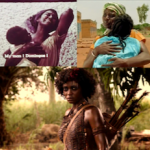LINK TO THE EVENT
Meeting number: 842 128 195
Password: JUpS3MJDp73
Cinematic representations of African women in situations of political conflict, including fictional, biographical and documentary, have become an important source of information from which many people acquire their understanding of some of these women’s experiences.
However, filmmakers do not just show, even in documentaries; they construct meaning through images and sounds depicted on the screen. As a means of communication, films therefore contribute to the creation of perceptions about the identities and experiences of the individuals and communities they represent. This form of communication, as Graeme Turner (2009) notes, happens within specific cultural contexts.
The link between culture and representations complicates the position of African women participating in, and/or affected by political conflicts because, due to limited resources, including financial and technical, they are rarely in a position to ‘present’ themselves using the various forms of media, especially film. They have to rely on others to represent them and give meaning to their experiences. How their experiences are constructed on film, to an extent, depends on how others understand those experiences. That is, their representations often depend on meaning-making processes external to their own. In the presentation Norita Mdege will use semiotic and discursive approaches, within the framework of intersectionality, to explore the values and ideas put forward in fictional and biographical cinematic representations of African women who participate in, and/or are affected by African political conflicts.
Mdege will further look at what perceptions these representations may create regarding African women’s roles in political conflicts. Such perceptions are of significance because, in many African countries, some political parties and leaders often justify their political authority morally by emphasising their roles in bringing liberation to their nations. Mdege will use semiotic and discursive approaches because they take into account the power dynamics involved in the construction of narratives. She will also pay attention to inter-textuality, that is, the accumulation of meanings across different texts, or cases where one text ‘refers to another, or has its meaning altered by being “read” in the context of other [texts]’ (Hall, 1997: 232).
The case study films are:
- Sambizanga (Sarah Maldoror, 1972)
- Sarraounia (Med Hondo, 1986)
- Rachida (Yamina Bachir, 2002)
- Nzinga, Queen of Angola (Sérgio Graciano, 2013)
About the speaker
Norita Mdege has a Ph.D. in film studies from the University of Cape Town, South Africa. Her current research focuses on the representations of African women and girls in films about African colonial and postcolonial conflicts. Her areas of interest include gender studies, women and girls in Africa, political conflict, African cinemas and cultural politics. She is currently a Visiting Fellow at the Gender Centre.
Within the Gender Seminar Series
The purpose of this seminar is to offer a platform of exchange for students, doctoral students in particular, and researchers whose work includes a gender perspective. During this monthly series, students will have the opportunity to discuss their work, meet peers from different disciplines at the Graduate Institute, as well as interact with guest speakers and faculty members.




